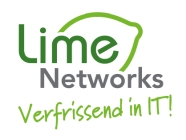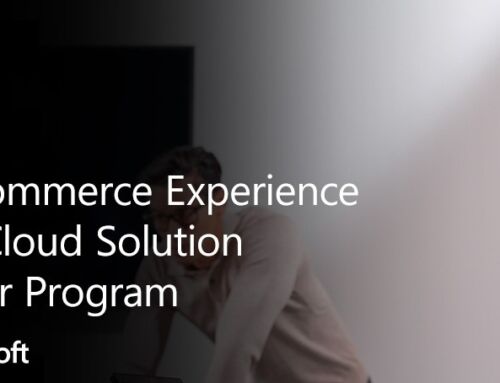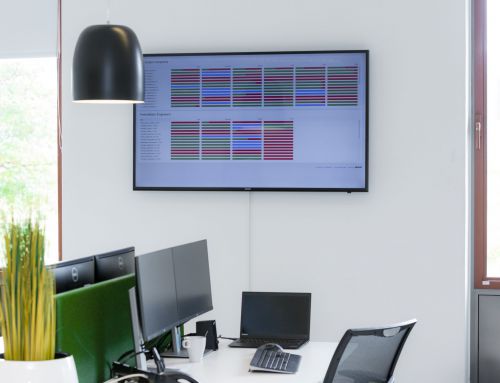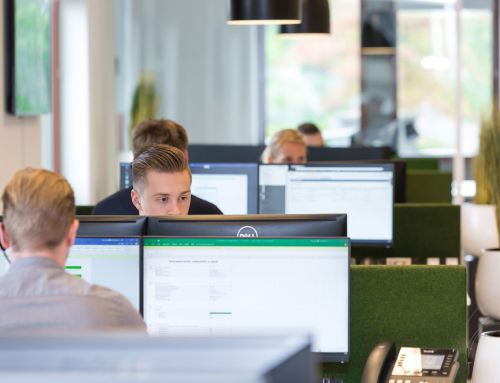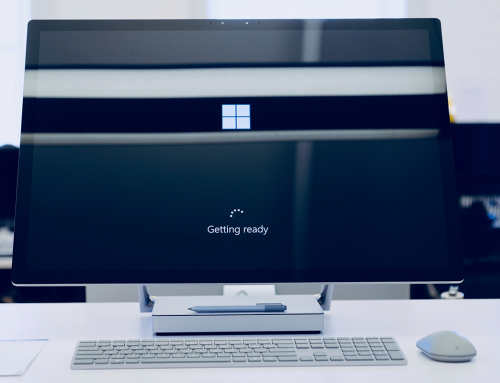Meer dan 50% van de MKB-bedrijven heeft al eens met een cyberaanval te maken gehad*. Cybercriminaliteit blijft dan ook toenemen. Maar over goede security wordt doorgaans te makkelijk gedacht; ‘antivirusprogramma erop en dan zal het wel goed komen’. Security is geen product als een virusscanner of een dienst die je eenmalig afneemt. Het is een proces. Dit is waarom en hoe jij dit wél goed aanpakt.
Waarom is het zo belangrijk om aandacht te besteden aan security?
De cijfers liegen er niet om: digitale bedreiging wordt steeds groter. Volgens voorspellingen zal de wereldwijde informatiebeveiligingsmarkt in 2022 €143,7 miljard waard zijn**. De jaarlijkse wereldwijde schade is enorm, namelijk €5 biljoen (5 miljoen x miljoen)***. De risico’s worden steeds groter en het wordt steeds makkelijker voor kwaadwillenden om een gerichte aanval uit te voeren. Heb je niet de juiste bescherming, dan loop je de kans om het slachtoffer te worden.
Elk bedrijf heeft wel belangrijke data ergens op het netwerk staan. Of dit nu gaat om cijfers en teksten die niet voor andermans ogen geschikt zijn of persoonsgegevens van klanten; intellectueel eigendom moet worden beschermd.
Wat kan er gebeuren als je security NIET serieus neemt en je slachtoffer wordt van cybercriminaliteit?
- De data kan op straat komen en in handen komen van mensen voor wie dit niet bedoeld is. Denk aan klantgegevens of productgegevens.
- De concurrent gaat aan de haal met de data die totaal niet geschikt was en behaalt hiermee een aanzienlijk concurrentievoordeel.
- Sommige informatie is strikt vertrouwelijk, zoals gevoelige medische gegevens die bij ziekenhuizen aanwezig zijn.
- Je kunt financieel failliet gaan als bedrijf. Denk aan de boetes die je krijgt wanneer je je niet aan security regels houdt, rechtszaken of losgeld bij afpersing. De financiële risico’s zijn enorm.
- Het kan leiden tot reputatieschade, een slecht imago en negatieve publiciteit. Dit heeft op zijn beurt weer gevolgen voor de waarde van de aandelen wanneer je een beursgenoteerd bedrijf hebt. Heb je dit niet? Dan kan deze schade alsnog invloed hebben op de aantrekkelijkheid van jouw bedrijf voor investeerders en (potentiële) werknemers.
Security als proces… wat is dat?
Security is meer dan een product. Mensen denken vaak dat ze veilig zijn met een security product, maar dat dekt vaak niet de lading. Je hebt verschillende producten die van toepassing zijn op hoe jij werkt. Uitvinden welke producten dat precies zijn is nog niet zo makkelijk.
Security is ook meer dan een dienst. Een phishing training is al een heel goed begin, maar het is geen garantie dat phishing niet meer voor gaat komen. Cybercriminaliteit is altijd in ontwikkeling en het kan altijd nog voorkomen dat iemand per ongeluk op een link klikt. Bovendien geldt hier ook: hoe weet je precies welke diensten je nodig hebt?
Security is daarom iets wat doorschemert in heel je bedrijf. De beveiliging moet overal in zitten en dit moet dan ook helder zijn voor iedereen binnen het bedrijf. Daarom omschrijven wij het als een proces. Het is geen eenmalig iets; de techniek verandert continu en ook de vijand staat niet stil. Voorwaarden blijven aan verandering onderhevig en kwaadwillenden zijn altijd op zoek naar nieuwe lekken om aan te vallen en geld te verdienen. Besteed jij maar 1x per jaar tijd en aandacht aan security? Dan loop je dus significant risico.
Veelgemaakte fouten op het gebied van security
Hierboven gaven wij al wat misvattingen over security en wat risico’s. Maar wat zijn nu de meest gemaakte fouten op het gebied van veiligheid? Wij onderscheiden er hier een paar.
- Niet de juiste mensen in dienst hebben. Wat wij het vaakst zien is dat er simpelweg niet de juiste mensen aanwezig zijn. Er is één systeembeheerder maar die heeft het eigenlijk altijd veel te druk. Die heeft niet voldoende tijd om ook nog eens een blik te werpen op de beveiliging. Daardoor krijgt beveiliging als proces veel minder aandacht dan zou moeten.
- Denken dat security een bijzaak is. ‘Dat overkomt ons toch niet, er zijn zo veel bedrijven die hun security slechter op orde hebben’, ‘Wat hebben zij nou te halen bij ons?’ of ‘Wij zijn het doelwit niet’. Door deze nalatigheid wordt security gezien als een bijzaak en krijgt het niet de aandacht die het vereist. Helaas bewijst de praktijk vaak het tegendeel.
- Besparen op security in verband met budgettaire kwesties. Door gebrek aan bewustzijn weten bedrijven vaak niet hoeveel goede security als proces eigenlijk waard is. Bij het opstellen van budgetten wordt er daarom bespaard op security – met alle gevolgen van dien.
- Niet updaten. In het kader van ‘security als proces’ willen wij graag benadrukken dat je een omgeving continu moet bijwerken of updaten. Werk je het niet bij, dan loop je simpelweg gevaar.
- Onwetendheid. Wij merken vaak dat mensen niet zo goed weten wat er allemaal mogelijk is. Goed gemonitorde laptops zijn toch voldoende? En als Lime Networks alles beheert dan maakt het toch verder niet uit wat er gebeurt? Het klopt dat wij een groot gedeelte van de zorgen uit handen nemen, maar nogmaals: security is geen dienst, maar een proces. Vul dit daarom aan met pentesten of andere oefeningen. Wij doen aanbevelingen maar jij zult zelf ook nog aan de slag moeten.
Waarom is een goede IT-partij hierbij van groot belang?
Het is een groot probleem wanneer jij niet de juiste mensen in dienst hebt om de beveiliging te kunnen verzorgen. Een goede IT-partij inschakelen kan hiervoor de uitkomst bieden. Deze IT-partij stelt kritische vragen om de risico’s in kaart te brengen en ook te analyseren hoe groot deze risico’s zijn en welke kosten het met zich meebrengt om dit op te lossen. Dit zijn ongoing processen waarbij je in gesprek gaat met je IT-afdeling, IT-manager en leverancier.
Natuurlijk kun jij het ook zelf proberen. Maar wil je die tijd eraan kwijt zijn? Hoe weet je waar je moet beginnen? Kan je dan wel zorgeloos aan de slag?
Een goede IT-partij is proactief, kritisch en innovatief:
- Proactief: zo volgen wij het beveiligingsnieuws en kijken wij bij nieuwe dreigingen wat jij als klant nodig hebt. Wij hebben passie voor techniek en lossen problemen al op voordat jij die ook maar had gezien of gemerkt.
- Kritisch: ook doen wij continu revisies op hoe de diensten geleverd worden. Er gebeurt bij IT veel op de achtergrond en het is veel werk om daar zelf achteraan te gaan. Wij communiceren hier helder over, zodat jij zorgeloos aan de slag kunt met dingen waar jij de expert in bent. Optimale efficiëntie!
- Innovatief: tot slot gaan wij mee met de nieuwste technieken en weten wij wat er speelt. Zo kunnen wij het inzetten op de juiste manier en ervoor zorgen dat mensen efficiënt blijven en veilig blijven werken. IT vormt de kern van jouw concurrentiepositie. Met goed geregelde IT krijg jij die voorsprong op jouw concurrenten in plaats van dat je achter gaat lopen.
Trap niet in de valkuilen van het regelen van security en zorg ervoor dat jouw security gewoon goed werkt. Schakel experts in die weten hoe security in elkaar zit, wat de dreigingen zijn en hoe security voor jou als proces kan worden ingezet. Met alleen dat tooltje of die superdrukke IT-manager binnen jouw bedrijf ben je er niet!
* Bron: Centraal Beheer
** Bron: Gartner
*** Bron: Cybersecurity Ventures
Wij leveren IT-diensten en producten voor de MKB! Wij combineren onze passie voor IT met kennis en ervaring om jouw bedrijf op een veilige manier te laten presteren. Wij werken volgens het ‘secure by design’-principe, waarbij IT-veiligheid van jouw omgeving centraal staat bij elk proces, dienst of product.
Wil jij ook jouw IT uit handen geven?
Maak een afspraak met me
Wil je weten wat wij kunnen doen voor je? Een verfrissende blik op je IT is leuk, maar je moet er wat aan hebben. Hoe kan het beter en veiliger? Laat je contactgegevens achter en dan bellen wij jou!
Veelgestelde vragen over velig werken
Staat jouw vraag er niet tussen? 1 mailtje of 1 telefoontje is genoeg om hem beantwoord te krijgen. 010-2121806 | info@limenetworks.nl
Wij kunnen jouw personeel bewustmaken van risico’s en risicovol gedrag. Voor security awareness kunnen wij jouw personeel een training geven (extern of intern) met een partner die hier ervaring mee heeft. Daarnaast kan optioneel een tool worden geleverd op de werkplekken die kennis meet, op peil houdt en rapporteert aan verantwoordelijken. Zo krijg je een voortdurende verbetering in het bewustzijn van risico’s en het vermijden van risicovol gedrag.
Ja en nee. Cloud op zich heeft geen veiligheid in zich. Afgezien dat aan de buitenkant (en soms aan de binnenkant) niet zichtbaar is wat de fysieke locatie is van jouw data in het geheel. Maar hoe meer vis in de zee, des te meer vissers op het water & hoe groter de vis, des te meer moeite men doet om hem op te vissen. Zo is het met waardevolle data ook. Een cloud dienst is dus een waardevol object voor hackers door de grote hoeveelheid data. Jouw netwerk is zo stukken minder interessant.
Fout. IT is complex en beveiliging ervan nog stukken complexer. Er gaat dus tijd, kennis en kunde in zitten om jou hier veilig in te laten werken – veelal op de achtergrond zodat jij er niets van merkt. 20 jaar geleden waren wachtwoorden zeldzaam. 10 jaar geleden wist iedereen wel wat wachtwoorden van collega’s. 5 jaar geleden was MFA bekend maar werd het weinig gebruikt in het MKB. En dan hebben wij het alleen over wachtwoorden. Wij maken IT simpel voor klanten zodat veilig werken haalbaar wordt en wij zo jouw risico’s kunnen minimaliseren.
Retentie is letterlijk ‘vasthouden’. Bij data en back-ups is retentie een zeer belangrijke factor. Het gaat niet alleen om het vasthouden van je data, maar ook over de mate van verandering van je data. Als je elke maand een back-up hebt en deze een jaar bewaart, dan betekent dit dat de retentie maximaal een jaar teruggaat en een maand verlies van data kan opleveren. Het leek een goed plan, maar blijkt in de praktijk niet afdoende. Verschillende back-upstrategieën kunnen de retentie van je data een stuk beter laten presteren. In MKB Nederland moet je minimaal 7 jaar je data bewaren die direct gelinkt is aan de toegevoegde waarde van je producten of diensten. Dan kom je met een back-up van maximaal 7 jaar flink bedrogen uit.
Veilig Werken is topsport. Maar jouw werknemers zijn niet allemaal topsporters. Het is een complex probleem wat niet zomaar op te lossen is. Jouw bedrijf moet namelijk leveren en jouw mensen moeten presteren. Je hebt dus hulp nodig van iemand met ervaring en focus op veilig werken. Een betrouwbare IT-partij kan hierbij een goed startpunt zijn. Zij regelen de basis en helpen jou verder met veiligheid, waar nodig specifiek in jouw bedrijf. Bijvoorbeeld met procedures voor verloop van personeel of de fysieke beveiliging van je bedrijf.
Hoe veilig jij werkt is te meten. Met een technische beveiligingstest of pentest kun je altijd kijken waar de zwakke plekken liggen in de beveiliging van je IT-apparatuur, programmatuur en netwerk. Maar ook bijvoorbeeld je website of ontwikkelde applicatie kan uitvoerig getest worden. Daarnaast kun je een procedurele beveiligingstest laten uitvoeren. Dit heeft weinig te maken met IT; het houdt in dat je test hoe veilig het handelen binnen jouw bedrijf is. Oftewel: zijn je procedures op orde?
Bel je IT-verantwoordelijke. Deze mensen weten (waarschijnlijk) wat je moet doen, mits ze bekend zijn met de materie. Het inschakelen van jouw IT-partij, intern of extern, is de eerste stap. Zij achterhalen waar de hack heeft plaatsgevonden, weten hoe ze hem direct moeten stoppen of de pas af kunnen snijden en zorgen ervoor dat de schade zoveel mogelijk beperkt wordt. Daarnaast wil je data veiligstellen over de hack zoals logfiles van servers, netwerkapparatuur etc. Zo kan je ook achterhalen wat er misging of dit overleggen met een gespecialiseerd security-bedrijf (bijv. Northwave). Tevens kan dit van belang zijn om te zien hoe verdere veiligheidslekken kunt voorkomen en wellicht vraagt je verzekering ernaar.
Jazeker. Het gaat er vooral om wat het doel is van je data en de beveiliging. Het kan variëren van een dataroom voor het delen van data met meerdere partijen voor een overname van een bedrijf – maar ook het inrichten labels op data in Office 365 zodat voor regelgeving of rechtswege jouw bedrijf en jouw data aan alle eisen voldoet. Je moet vooral veilig kunnen werken. Efficiënt zonder dat je gevaar loopt.
Heel erg veilig. Dit doen ze door data opslag en het versturen van data te beveiligen. LastPass beveiligt jouw data, verstuurt het encrypted , slaat dit encrypted op en laat jou MFA gebruiken voor het gebruiken van deze data. Jouw inloggegevens en data zijn dus in deze procedure absoluut veilig. Daarnaast hebben ze een helder bountyprogramma voor bugs, waardoor jij en andere gebruikers fouten direct kunnen melden. LastPass blijft dus niet stilzitten totdat er iets misgaat maar werkt continu aan verbeteringen om de veiligheid te optimaliseren.
Wij vinden dat klanten eigenaar zijn van de IT die ze hebben. Wij maken klanten bewust van de risico’s die ze lopen en oplossingen die daarvoor voor handen zijn. Uiteraard wijzen wij hierop en geven aan waar het eventueel mis kan gaan als je andere keuzes maakt. Wij kiezen voor Veilig Werken maar begrijpen jouw keuzes. Zo werken wij samen en delen wij kennis en ervaring.
Elk klantverzoek wat te maken heeft met veiligheid of rechten op data/systemen wordt altijd overlegd met degene in jouw organisatie die daarvoor gemachtigd is. Dit kan een directielid, een IT-manager of een andere bestuurder zijn. Zo wordt dit netjes vastgelegd en gecontroleerd. Dit voorkomt dat iemand even het wachtwoord van een ander leent, even tijdelijk de mailbox van een collega bijwoont of een extern persoon van de CRM software toegang verleent zonder dat dit wenselijk is.
Neem bijvoorbeeld een netwerk. Als je een netwerk aanlegt en beheert moet je standaardiseren op veiligheid. Door zo min mogelijk variaties in het aantal oplossingen kun je meer tijd besteden aan testen, instellingen, basis configuraties met optimale veiligheid, documentatie. Ook zijn verschillende configuratieopties voor klanten nu veel beter onderzocht en gemakkelijker te ondersteunen en te beveiligen. Wij doen onderzoek naar verschillende beveiligingsopties en schakelen derden in om deze te controleren. Een setup die goed gestandaardiseerd en geconfigureerd is verlaagt veiligheidsrisico’s en maakt de installatie op kantoor een stuk sneller. Daarna zorgen wij gecontroleerd voor tijdige updates aan de software en instellingen. Wij monitoren en meten wat er op je netwerk gebeurt. Zo is het eerder inzichtelijk als het misgaat. Ook het scheiden van gasten, klanten en niet-bedrijfsapparatuur van het bedrijfsnetwerk is essentieel om misbruik te voorkomen. Regelmatig de beveiliging tegen het licht houden en bijsturen doen wij voor alle klanten in één enkele handeling door een centrale aansturing. Tot slot worden configuraties netjes opgeslagen en geback-upt. Zo kun je in geval van nood direct vervangende apparatuur neerzetten als het ooit eens misgaat. ‘Secure by design’ is niet een methode of een set maatregelen. Het moet in je DNA zitten. Zo maken wij bij Lime Networks de meest complexe IT simpel.
De AVG is voor persoonsgebonden gegevens. Dus gegevens die jij bewaart of verwerkt die direct gerelateerd zijn aan personen. Denk aan NAW gegevens met bankrekeningnummers of bijvoorbeeld gegevens over ziekteverzuim, verzekeringen, verloning, etc. Dat je deze gegevens hebt of verwerkt is niet het probleem. Maar het niet nadenken over wie ze kan inzien of wie de toegang kan verschaffen of hoe ze bewaard en geback-upt worden; dat is wel spannend. Door hierover na te denken en inzicht te krijgen kun je adequaat processen inrichten.
Het is een anagram die inhaakt op de hoeveelheid moeite die nodig is. Iedereen kan wel een eindje joggen, de een wat verder dan de ander. Maar de marathon binnen de 3 uur is al knap lastig. Oefenen, trainen, techniek, goede spullen, ervaring is jarenlang nodig om dit te bereiken. Met Veilig Werken is dat net zo. Het is geen firewall instellen en antivirus installeren. Dat stadium zijn wij al jarenlang voorbij. Met deze ernst zie je misschien ook in dat jij zakelijk gezien zelf geen tijd hebt om topsport in techniek te bedrijven en schakel je ons in voor deze zaken. Wij zijn getraind, hebben ervaring en gaan voor de medaille zodat jij veilig kunt werken.
Dat is een nuchtere benadering. Maar met jouw gegevens kan jouw bedrijf of kunnen anderen wellicht flink benadeeld worden. Let dus altijd op hoe en waar je gegevens deelt.
Als je gevraagd wordt ergens in te loggen, klik dan niet op de link in de e-mail. Zo simpel is het. Gaat het over bankzaken, ga zelf naar de website van je bank en kijk daar in de berichten service. Gaat het over je documenten online van een cloud dienst, ga naar je eigen inlogpagina die je kent en log daar in. Gaat het over een dienst van een klant, dan kun je hen bellen voor confirmatie. Log hierbij nooit in met je eigen gegevens, maar enkel de gegevens verstrekt zijn door hen. Hierdoor voorkom je dat je op verkeerde links drukt, ingaat op verkeerde voorstellen of programma’s downloadt of dat je toestemming verleent die malicieus is of onrechtmatig. Het zorgt ervoor dat jij slim bezig bent.
Neem het voorbeeld van de universiteit van Maastricht in december 2019. Toen zorgde een hack met een vervelend stuk software dat het complete universiteitsnetwerk met het grootste gedeelte van de server structuur en werkplekken onbruikbaar werd. Wat was de schade:
- FOX-IT werd ingeschakeld in weekenden, Kerst, oud & nieuw etc. om onderzoek te doen en kennis te delen met de hack, het opruimen ervan en hoe te herstellen.
- Een zeer groot gedeelte van de computers moest opnieuw geïnstalleerd worden. Ook moesten deze computers worden gecontroleerd op sporen van het virus in onderdelen waar je niet zo snel zicht op hebt (bios of geheime partities op de harde schijf/SSD schijf).
- Vrijwel alle productieservers en back-ups lokaal werden onbruikbaar. Enkel herinstallatie ging helpen voor het herstel.
- Er is losgeld betaald aan de hackers om de netwerk structuur/Active Directory te ontsleutelen (de Volkskrant spreekt over tonnen losgeld).
- Een groot gedeelte van de servers moest opnieuw worden geïnstalleerd en data uit back-ups moest worden teruggezet waar mogelijk.
- Eigen werknemers en externen waren vele dagen bezig met alle herstelwerkzaamheden… Dit gebeurde ook tijdens de feestdagen in december.
- De imagoschade was enorm. Als bedrijf kan zoiets ook veel klanten kosten of investeerders afschrikken.
- Eén back-up is geen back-up.
- Zorg minimaal voor drie kopieën van je data, op 2 verschillende locaties waarvan één minimaal beveiligd.
- Controleer regelmatig dat hij ook echt werkt en de data is terug te zetten.
Niet altijd. Soms worden back-ups ook geïnfecteerd of zijn back-ups niet afdoende om snel weer aan het werk te gaan. Hoeveel data verlies je wat is de hersteltijd. Hoe erg is het als het hele bedrijf 24 uur niet kan werken?… Of misschien langer? Ook het omgaan met retentie is belangrijk. Als je vorige week gehackt bent en de gevolgen worden vandaag pas zichtbaar, heb je dan genoeg back-ups/retentie om in het verleden terug te kijken? Een medewerker die vorig jaar het bedrijf heeft verlaten en gegevens heeft gewist of buitgemaakt is ook een hack. Kun je wel een jaar terug met je back-up? Tot slot moet je ook een plan hebben als het misgaat en kijken hoe snel je weer op de been bent. Een continuïteitsplan helpt daarbij.
Dan zijn wij er natuurlijk ook voor je. Stel dat je bijvoorbeeld wordt gehackt, dan zorgen wij er direct voor dat de aanval gestopt wordt en dat logfiles en sporen zo veel mogelijk behouden blijven. Zo kunnen wij zien wat de impact is van de aanval en welke gegevens mogelijk zijn buitgemaakt. Dit helpt vaak in het proces van inzicht of bij de verzekering. Wij werken met standaard procedures waarbij we op een zelfde methodiek aan de slag gaan om problemen op te lossen. Ook kan het waardevol zijn met forensisch onderzoek. Het zou vervelend zijn als een hack (zonder dat gegevens zijn buitgemaakt) leidt tot een excuusbrief aan al je klanten of leveranciers en imagoschade.
Dat hoeft niet. Met Bitlocker kun je de gegevens op je laptop netjes beveiligen tegen diefstal. Een gestolen laptop is op deze manier geen probleem en gegevens blijven veilig. Wist je ook dat wij je gegevens op afstand kunnen wissen in het geval van diefstal, mits jouw gestolen laptop of telefoon contact krijgt met het internet? De decryptiecodes worden door ons netjes opgeslagen in jouw zakelijke omgeving zodat in het geval van nood of vervanging van je harde schijf de gegevens weer veilig uitgelezen kunnen worden.
Bij Lime Networks werken wij volgens ISO 27001 standaard. Dat betekent dat wij over fysieke en virtuele beveiliging nagedacht hebben en hier actief onze processen op hebben ingericht. Dit wordt jaarlijks verbeterd en gecontroleerd door het TüV. Je kunt hier meer over ISO lezen: https://limenetworks.nl/iso Onze kennis over IT en beveiliging zetten wij in om jouw omgeving zo veilig mogelijk te maken. Van je werkplek, je vaste en Wi-Fi netwerk, je servers, smartphones en cloud diensten.
Met MFA heb je twee manieren van identificatie. Vaak komt dat neer op inloggegevens (gebruikersnaam en wachtwoord) en een code via app op je smartphone. Iemand die nu jouw inloggegevens heeft buitgemaakt, kan alsnog niet inloggen op systemen of diensten, omdat hiervoor ook die code van jouw smartphone nodig is. Ben jij of is jouw bedrijf/leverancier gehackt? Dan hoeft dat dus geen probleem te zijn. Wij gebruiken hiervoor Microsoft Authenticator. De extra inlogcodes zijn geen eigen systemen maar open. Met de Microsoft app kun je dus ook MFA instellen op je Gmail account, je bank, Office 365, leverancier van cryptovaluta of je Apple ID. Het is een generieke standaard.
LastPass zorgt voor een veilig punt voor het opslaan van wachtwoorden, een soort wachtwoordenkluis waar je alleen in kunt met een master password. Tevens helpt het je in je dagelijks werk met inloggen op websites en diensten. Het werkt op je vaste pc of laptop en op je smartphone. Het is gratis in gebruik. Je kunt zo veilig werken met complexe wachtwoorden zodat dat dit heel erg lastig wordt. De betaalde variant is zakelijk gezien ook handig. Zo kun je accounts aanmaken en zelf beheren voor bijvoorbeeld een leverancier of een social media account en deze delen met collega’s of externen. Zij kunnen inloggen (via hun gratis account van LastPass) en zo het wachtwoord niet zien maar wel gebruiken. Mocht het account niet meer relevant zijn voor anderen, dan kun je de machtigingen individueel weer intrekken zonder dat je wachtwoorden hoeft te wijzigen.
Dat is lastiger dan je denkt en is niet in een paar zinnen te verwoorden. Wel hebben wij hierover een blog geschreven en die vind je hier. https://limenetworks.nl/spam-of-phishing-mail-herkennen-voorkomen-en-oplossen
Je kunt beginnen door bewust te zijn dat je veilig wilt werken. Dat is gelukt bij deze vraag, dus laten wij gelijk de volgende, makkelijke stappen noemen. Gebruik legale software! Zorg op je pc voor een goede antivirus/antimalware oplossing (betaal hier ook voor; géén gratis variant). Zorg altijd dat je de meest recente versies en updates hebt voor je systeem en je software. Zorg ook voor de meest recente beveiligingspatches en updates. Gebruik een wachtwoord manager (zoals LastPass; is gratis voor privégebruik) en gebruik niet dezelfde wachtwoorden voor verschillende systemen en accounts. Gebruik MFA (multi factor authenticatie) voor alle diensten/accounts die zich online bevinden. Wij zijn er nog lang niet, maar met deze maatregelen ben je geen laaghangend fruit voor hackers en al helemaal niet voor het grootste gedeelte van online criminaliteit.
Veilig Werken staat voorop bij ons. Het is niet een kernwaarde, maar een aorta die door ons bedrijf gaat. Met ‘secure by design’ zorgen wij continu dat onze producten en eigen interne processen als basis Veilig Werken en ook veilig zijn ingericht. Daarbij is de klant onze focus. Wij maken complexe IT zaken simpel; beveiliging en Veilig Werken zijn hierin de basis.
Als wij uitgaan van een veilige werkplek, dan is het veilig houden een serieuze taak. Belangrijkste is dat de werkplek altijd up-to-date is. Voor het OS, de hardware, geïnstalleerde programma’s, antivirus/antimalware. Door gebruik te maken van Bitlocker en MFA zorgen wij dat toegang lastig is. Met policies voor de firewall en door het gebruik van monitoring houden wij de boel strak in de gaten.
Wij zijn Microsoft Gold Partner op drie vlakken, waarvoor de medewerkers van Lime Networks veel opleidingen succesvol hebben afgerond en er courante klantcases zijn goedgekeurd door Microsoft. Daarnaast zijn er nog veel certificeringen op gebied van security, voice, netwerken en dergelijke. Wij werken volgens de richtlijnen en standaarden van onze leveranciers. Ook ons ISO 27001-certificaat zonder opmerkingen zorgt voor de juiste werkwijze en instelling.
Met ‘secure by design’ wordt er bij elke keuze voor een product of dienst nagedacht over de implicatie voor de IT-veiligheid van jouw omgeving. Dat betekent dat er rekening gehouden wordt met de hoogste eisen voor security, zoals encryptie, MFA, AVG, toegangsbeheer, etc. Dit zorgt ervoor dat wij altijd achter onze producten staan en wij weten hoe de dataveiligheid en beschikbaarheid in elkaar zitten.
